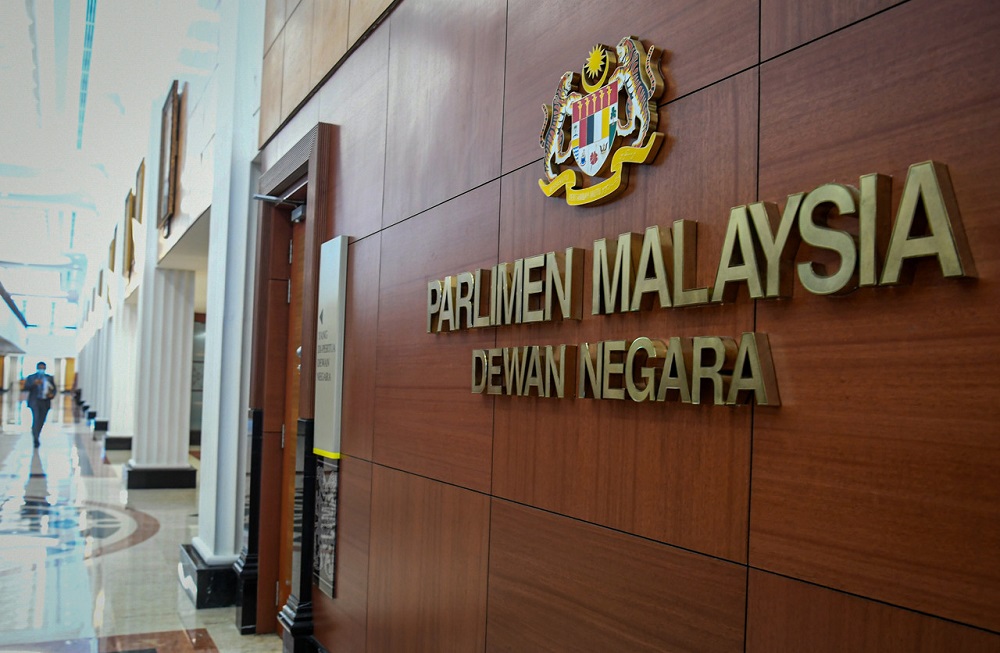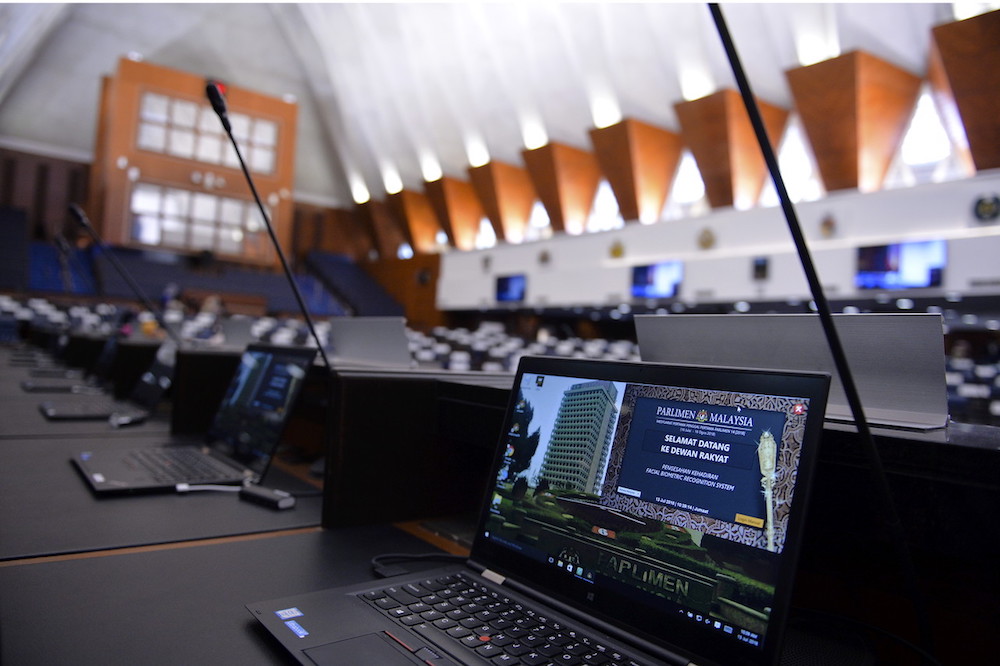KUALA LUMPUR, July 26 — Federal lawmakers will finally be able to return to Parliament from today to carry out their key duties of debating laws and policies, and holding the government accountable for its actions and how it spends public funds.
This is significant as Parliament has been suspended for the past seven months due to the nationwide Emergency. The Emergency started on January 11 and is expected to end on August 1, if it is not lifted earlier or extended.
In other words, there has been no parliamentary meeting since December 2020, with the last sitting in the Dewan Rakyat being on December 17 and the last sitting in the Dewan Negara being on December 29.
After repeated statements in June from the Istana Negara on the need to reopen Parliament as soon as possible and the filing of multiple lawsuits since January by politicians and regular Malaysians challenging the suspension of Parliament during the Emergency, the government on July 5 decided to hold special sittings for both the Dewan Rakyat and Dewan Negara.
The Prime Minister’s Office on July 5 said the special sittings are intended to provide explanations to MPs about the National Recovery Plan and to amend all the necessary laws and rules to enable hybrid Parliament sittings, and for the proclamations of Emergency and Emergency ordinances to be laid before Parliament.
Here's what to expect
According to the Parliament calendar, there will be five days of Dewan Rakyat sittings from today to July 29, and again August 2. The only matters listed in the schedule are briefings from ministers. Parliament's website states that the sittings are in three-hour blocks from 10am to 1pm and from 2.30pm to 5.30pm on Mondays to Thursdays.
While the Parliament calendar does not provide further details of events during the five-day sittings, the Dewan Rakyat secretary's July 15 notification letter to all MPs listed out the parliamentary affairs as decided by the prime minister.
This list includes the tabling of the July 11 proclamation of the nationwide Emergency and related Emergency Ordinances at both houses of Parliament (Dewan Rakyat and Dewan Negara).
Also included are the tabling of the two proclamations of Emergency dated December 12, 2020 in the Gerik parliamentary seat in Perak and in the Bugaya state seat in Sabah and the related Emergency Ordinances which had postponed the two by-elections there.
The third and final matter listed was briefings from ministers regarding the National Recovery Plan, the country’s vaccination programme, the implementation of the Emergency and economic stimulus packages.
In the same July 15 letter to MPs, the Dewan Rakyat secretary said the Speaker has allowed MPs to request explanations and provide opinions during the ministers' briefings.
Since then, MPs have questioned why the five-day Dewan Rakyat sittings did not include the customary debates; one even suggested that the ministers' briefings would be akin to a ceramah.
Dewan Rakyat Deputy Speaker Datuk Mohd Rashid Hasnon and Perikatan Nasional Backbenchers Club chairman Datuk Seri Shahidan Kassim have reportedly clarified that there would be no debates as there are no motions in this meeting.
Mohd Rashid suggested that asking questions or raising suggestions during the sittings could also be considered debates. He was also reported saying that MPs should only ask about Covid-19 matters to ministers and deputy ministers during the five-day sittings.
He said the motion on whether to have hybrid Parliament sittings is not on the agenda now as Parliament sittings can be done “normally”.
Communications and Multimedia Minister Datuk Saifuddin Abdullah also reportedly said the ministers' briefings do not mean that the MPs are to only listen while the ministers speak, and pointed out that Parliament's standing orders allow MPs to interject and ask questions and that it would be up to the Dewan Rakyat Speaker to allow issues to be debated.
Datuk Seri Takiyuddin Hassan, the minister in charge of Parliament and law, was reported saying that the Dewan Rakyat sittings would not be "one-sided explanations" or with MPs just listening to briefings, as MPs can seek clarification or give their views.
With just around six days before the Emergency is due to end on August 1, Umno president Datuk Seri Ahmad Zahid Hamidi -- who is also Bagan Datuk MP but on home quarantine — yesterday instructed Umno MPs to table a motion and vote to end the Emergency and its related Ordinances.
However, Dewan Rakyat Speaker Datuk Azhar Azizan Harun had earlier yesterday cited the Dewan Rakyat Standing Orders when saying that only the matters on the agenda set by the prime minister would be allowed for discussion in the special sitting and that other motions would not be allowed.
.jpg)
The numbers
Datuk Shabudin Yahaya, deputy minister in charge of Parliament and law, was reported saying no fewer than 2,500 people were involved in each sitting, as there would also be others involved such as MPs' officers, ministry officials, Parliament staff, building management staff.
Mohd Rashid previously said that the chief whips of political parties would be discussing the proposal of adopting last year’s measure of only allowing 80 MPs physically in the hall during the five-day Dewan Rakyat sittings.
He said the distribution would be 44 government MPs and 36 Opposition MPs, noting that MPs could rotate among themselves to attend each of the Dewan Rakyat’s morning or afternoon session.
Currently, there are 220 MPs as two parliamentary seats are vacant following the deaths of two lawmakers, with 80 parliamentarians amounting to about 36 per cent or just slightly above one-third of the full number.
Yesterday, Dewan Rakyat Speaker Azhar however said all of the 220 MPs will be allowed to sit in the Dewan Rakyat at the same time for the special sittings and that there will be no limit on the number of MPs.
According to Azhar, 205 MPs have received two doses of Covid-19 vaccine, while 12 have received one dose and three have not been vaccinated. He had said even those who had yet to be vaccinated would be allowed in.
The number of MPs attending is expected to be lesser than 220, however, as several MPs were reported to have tested positive for Covid-19 ahead of the special sittings, while several other MPs were said to have been flagged as close contacts.

The SOPs
The National Security Council has issued a set of Parliament-prepared standard operating procedures (SOPs) dated July 14, which requires all present in Parliament — including MPs and their officers, ministries' officers, the media — to undergo the RT-PCR test three days before attending.
The SOPs do not impose a requirement for MPs to be vaccinated against Covid-19, with a source confirming to Malay Mail previously that it is not compulsory for the lawmakers attending the special sittings to have undergone vaccination and that about a dozen among them were still unvaccinated despite lawmakers being prioritised for the jabs months ago.
The number of officers allowed at the Parliament meeting would be three each from the ministers' office and the Opposition leader, two each for deputy ministers' office, one each for an MP's office, three each from ministries, three each for official broadcasters, and one each for the media, the SOPs state.
The SOPs also prohibit those present from gathering outside the meeting space, and require any meetings both inside and outside the hall to avoid being done in crowded places, confined spaces or conversations at a close distance. Those attending are also required to not crowd around in lifts, toilets, the cafeteria, surau or any other spaces in Parliament.
The SOPs also carry an extensive list of responsibilities for the Parliament administration, including frequent disinfection of frequently-touched surfaces such as doorknobs, lift buttons and the transparent barriers, ensuring good ventilation at the meeting venue, assigning seating with one-metre gaps between each MP with transparent barriers between them and with the requirement that the MPs wear face masks at all times.
The Parliament administration is also required to prepare closed rubbish bins for the disposal of face masks and to ensure that they remain closed, and prepare packed food and for tight control of the designated place for eating. MPs meanwhile have to queue up with one metre gaps for food, and should maintain physical distance and not gather while eating.

What else and what’s next
The MPs will only officially return to their usual work in the Dewan Rakyat sittings in September and late October to mid-December.
Coming up is the Dewan Rakyat’s 15-day meeting from September 6 to September 30.
This will start with the royal address on the first day, followed by four days of debate on the royal address and two days of ministers’ replies, then the tabling of the 12th Malaysia Plan on the eighth day followed by four days of debate on it and three days of ministers’ replies.
After that, the Dewan Rakyat will sit for 32 days from October 25 to December 16, starting with four days for government Bills and government matters, and then the tabling of Budget 2022, seven days of debate at the policy stage on the Budget and three days of replies by ministers, 14 days of Budget debate at the committee stage and concluding with three days of government Bills and other government matters.
As a whole, that would mean the Dewan Rakyat would sit for 52 days this year (including the five-day special sittings), as compared to 55 days in 2020, 68 days in pre-pandemic 2019, and 70 days in 2018 (including 20 days for the March-April 2018 session and a total 50 days for the July-August and October-December sessions in 2018).
As for the Dewan Negara, so far there are only three days’ of special sittings scheduled from August 3 to August 5. This was announced by the prime minister and subsequently the Dewan Negara president.
This will be the first time that Dewan Negara is meeting since its last sitting on December 29, 2020 or seven months ago.
The Dewan Negara president has said the special sittings will involve the tabling of the Emergency proclamations and Emergency ordinances, as well as ministers’ briefing on the National Recovery Plan, the Covid-19 vaccination programme, the Emergency implementation and economic stimulus packages. Essentially, the same matters as in the Dewan Rakyat special sittings.
He said there would not be unexpected motions during the special sittings as the focus will be on the ministers’ briefings, and that he would consider any questions or explanations by Dewan Negara members based on their relevance.
The Dewan Negara met for 19 days in 2020, as compared to 25 days in 2019, 30 days in 2018 (eight days in March-April and a total 22 days in August-September and December in 2018).
Separately, Parliament’s Public Accounts Committee (PAC) plans to resume its proceedings on Malaysia’s Covid-19 vaccine procurement and usage by calling in the minister of science, technology and innovation on July 27 and the finance minister and the accountant general on July 28.
The PAC had previously on July 2 said that this was in line with the Yang di-Pertuan Agong’s June 29 statement that all parliamentary select committees should continue their meetings to carry out checks and balances to ensure transparent and responsible governance, especially in the handling of public and social policies and the country’s finances.



















